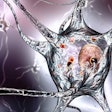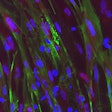
An analysis of more than 22,000 people with multiple sclerosis (MS) has identified a genetic variant associated with the speed of disease progression, pointing to new ways to treat the neurodegenerative disease.
Earlier genome-wide association studies (GWAS) found more than 200 genetic variants associated with susceptibility to multiple sclerosis, but were unable to identify mutations that influence the severity of the neurological disease. Understanding the genetic factors that affect disease progression could lead to therapies that prevent patients from developing disabilities.
An international research collaboration came together to try to fill that knowledge gap. Writing in Nature, the team described the analysis of data from the International Multiple Sclerosis Genetics Consortium and the MultipleMS Consortium. Pooling data from the two consortia created a 12,000-patient dataset.
The team compared genetic data to MS severity in a GWAS. The analysis of seven million genetic variants enabled the scientists to identify a variant associated with faster disease progression. The researchers linked the presence of the variant to a 3.7-year reduction in the median time to requiring a walking aid and to changes in brain tissue.
The location of the variant offers clues about why it may accelerate disease progression. The two genes on either side of the variant, DYSF and ZNF638, have no prior known connection to multiple sclerosis. However, their roles in the body suggest that they could be implicated in the disease: DYSF plays a role in cell repair; ZNF638 helps tackle viral infections.
“These genes are normally active within the brain and spinal cord, rather than the immune system,” Adil Harroud, lead author of the study, said in a statement. “Our findings suggest that resilience and repair in the nervous system determine the course of MS progression and that we should focus on these parts of human biology for better therapies.”
After discovering the variant, Harroud and his collaborators validated the finding in another dataset of almost 10,000 patients. People in the confirmatory dataset with two copies of the variant advanced to severe disease faster than other patients.
The identification of a genetic locus associated with disability suggests it may be possible to develop drugs that can slow disease progression. Current therapies can reduce, and in some cases halt, relapses; however, there remains a need for ways to treat progression. The researchers see scope for further work to show how the genetic variant affects DYSF and ZNF638, and are continuing to look for other variants.



















